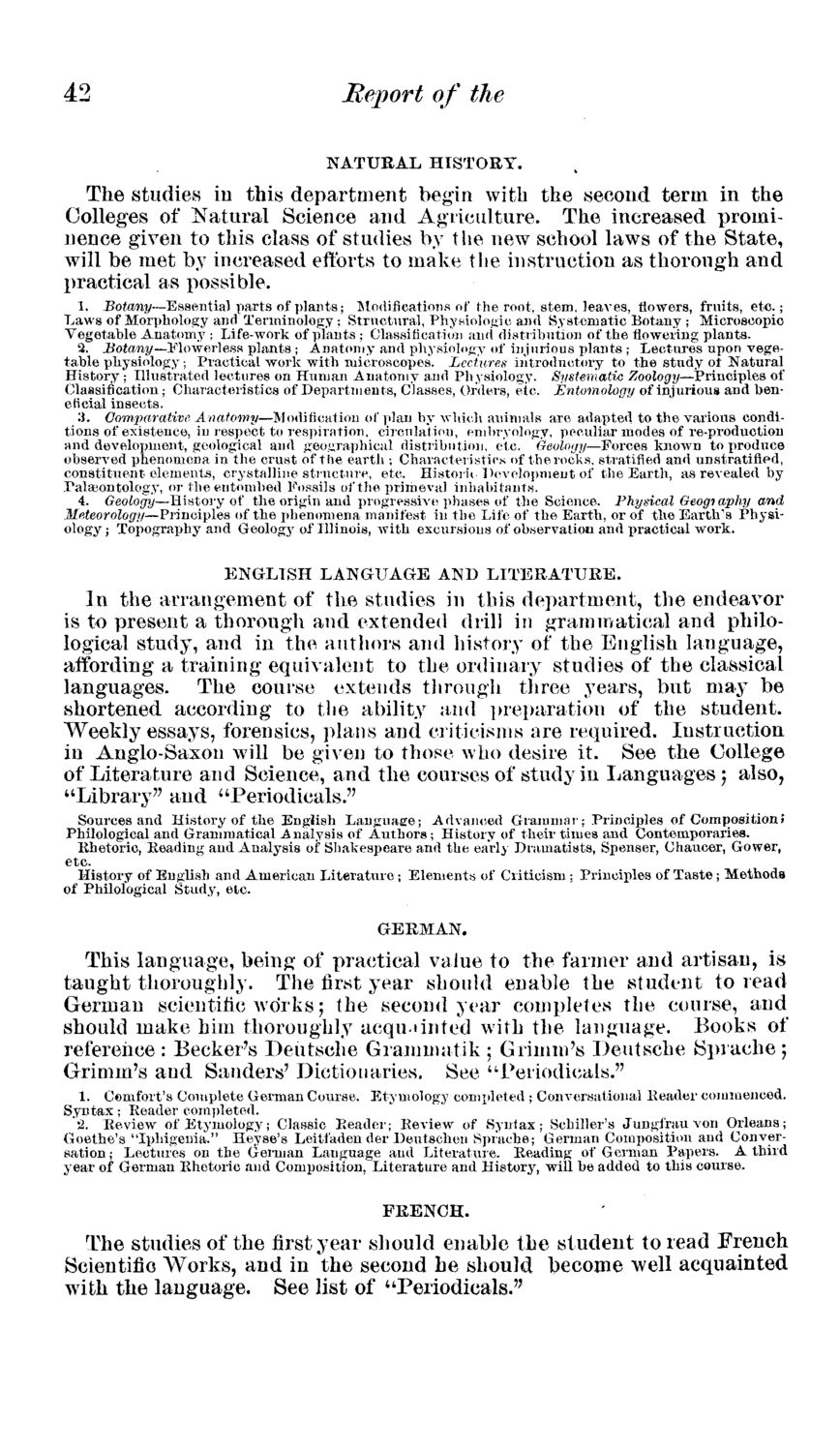| |
| |
Caption: Board of Trustees Minutes - 1874
This is a reduced-resolution page image for fast online browsing.

EXTRACTED TEXT FROM PAGE:
42 Heport of the NATURAL HISTORY. The studies in this department begin with the second term in the Colleges of Natural Science and Agriculture. The increased prominence given to this class of studies by the new school laws of the State, will be met by increased efforts to make the instruction as thorough and practical as possible. 1. Botany—Essential parts of plants; Modifications of the root, stem, leaves, flowers, fruits, etc.; Laws of Morphology and Terminology; Structural, Physiologic and Systematic Botany ; Microscopic Vegetable Anatomy ; Life-work of plants ; Classification and distribution of the flowering plants. 2. Botany— Elowerless plants ; Anatomy and physiology of injurious plants ; Lectures upon vegetable physiology; Practical work with microscopes. Lectures introductory to the study ot Natural History ; Illustrated lectures on Human Anatomy and Physiology. Systematic Zoology—Principles of Classification; Characteristics of Departments, Classes, Orders, etc. Entomology of injurious and beneficial insects. 3. Comparative Anatomy—Modification of plan by which animals are adapted to the various conditions of existence, in respect to respiration, circulation, embryology, peculiar modes of re-production and development, geological and geographical distribution, etc. Geology—Forces known to produce observed phenomena in the crust of the earth ; Characteristics of the rocks, stratified and unstratified, constituent elements, crystalline structure, etc. Historic. Development of the Earth, as revealed by Palaeontology, or the entombed Fossils of the primeval inhabitants. 4. Geology—History of the origin and progressive phases of the Science. Physical Geography and Meteorology—Principles of the phenomena manifest in the Life of the Earth, or of the Earth's Physiology ; Topography and Geolog}r of Illinois, with excursions of observation and practical work. ENGLISH LANGUAGE AND LITERATURE. In the arrangement of the studies in this department, the endeavor is to present a thorough and extended drill in grammatical and philological study, and in the authors and history of the English language, affording a training equivalent to the ordinary studies of the classical languages. The course extends through three years, but may be shortened according to the ability and preparation of the student. Weekly essays, forensies, plans and criticisms are required. Instruction in Anglo-Saxon will be given to those who desire it. See the College of Literature and Science, and the courses of study in Languages ; also, "Library" and "Periodicals." Sources and History of the English Language; Advanced Grammar; Principles of Composition5 Philological and Grammatical Analysis of Authors ; History of their times and Contemporaries. Rhetoric, Reading and Analysis of Shakespeare and the early Dramatists, Spenser, Chaucer, Gower, etc. History of English and American Literature; Elements of Criticism ; Principles of Taste; Methods of Philological Study, etc. GERMAN. This language, being of practical value to the farmer and artisan, is taught thoroughly. The first year should enable the student to read German scientific works; the second year completes the course, and should make him thoroughly acquainted with the language. Books of reference : Becker's Deutsche Grammatik ; Grimm's Deutsche Spraehe ; Grimm's and Sanders' Dictionaries. See "Periodicals." 1. Comfort's Complete German Course. Etymology convicted ; Conversational Header commenced. Syntax; Reader completed. "2. Review of Etymology; Classic Reader; Review of Syntax; Schiller's Jungfrau von Orleans; Goethe's "Iphigenia." Heyse's Leitfaden der Deutschen Spraehe; German Composition and Conversation ; Lectures on the German Language and Literature. Reading of German Papers. A third year of German Rhetoric and Comx)osition. Literature and History, will be added to this course. FRENCH. The studies of the first year should enable the student to read French Scientific Works, and in the second he should become well acquainted with the language. See list of ''Periodicals."
| |